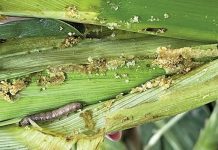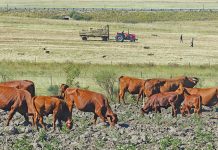Eastern Cape hunting outfitters and wildlife ranchers have criticised what they call the indiscriminate eradication of wildebeest, sought-after antelope like nyala and endangered white rhino in reserves controlled by the Eastern Cape Parks Board (ECPB).
Arthur Rudman, director of Wildlife Ranchers SA, contends this is due to the historically extralimital ideologies of the ECPB executive. He said the antelope are being culled and sold at meat value, while the white rhino are being put out to tender to professional hunters as trophies.
“We don’t oppose hunting excess animals as a form of management which promotes sustainable use of natural resources,” he said. “But this eradication process, at the whim of the Parks Board executive, isn’t even supported by the Eastern Cape environmental department. There’s no proof the so-called extralimital species weren’t found in the region in the recent past, possibly until the rinderpest in 1897.”
Rudman can’t understand how international conservation bodies allow fallow deer, which originated in India, to be accommodated in countries like Sweden, Texas and New Zealand, but don’t want indigenous game such as nyala in ECPB reserves.
He said there’s also no need to shoot the rhinos. “The Professional Hunters’ Association of SA (Phasa) is able to finance the capture of the few remaining ones. Many ranchers would like to buy them for breeding purposes. The ECPB has never even tested darting and lifting by helicopter as a method of removal. The endangered rhino that were culled were protected under the Convention on International Trade in Endangered Species (CITES). They could’ve been saved and relocated if the wildlife industry had been consulted.”
No consultation
He said the ECPB executive members’ opinions seem to be more important than those of the international and national hunting industries or the region’s eco-tourism operations. “Already, their actions are destroying eco and hunting tourism in the Greater Fish River Reserve complex and can eventually cause huge employment and revenue losses if popular game viewing species are removed.
“They continue to make decisions without talking to, or accepting advice offered by, the Stakeholders in the Eastern Cape Safari Industry Committee (Secsicom).”
According to Rudman, the executive is also sabotaging attempts to establish previously disadvantaged individuals in the private wildlife industry.
“Phasa financially supports BEE in the professional hunting industry by raising about R1 million a year to educate people and help them enter the field. We’ve repeatedly asked the ECPB executive to stop their ideology-driven process of eradication and let these qualified candidates hunt and apply their trade in the province’s parks and reserves, but to no avail.” Rudman said the executive members who make the culling decisions don’t understand the logistics of commercial animal and meat production, as they have no experience as ranchers.
“Game in the rest of the country, including on private property, will suffer the same fate if the new legislation for alien and invasive species and translocation policies is approved by parliament. Should this happen, there’s no question litigation will follow. We won’t allow our game and eco-tourism enterprises, built without state aid, to be destroyed.”
He pointed out the situation was even more ridiculous because the province’s environment department previously promoted the translocation of all the animals now under fire, by advertising and selling them at their game auctions.
Rudman fears the sudden, badly planned culling of large numbers of game will impact on predator populations in the parks. He warned predators will be forced to move out of the reserves and onto neighbouring stock farms.
“Similar ideologies were behind the Threatened and Protected Species (TOPS) legislation. It immediately lowered the popularity of the black wildebeest, being a TOPS species, resulting in thousands being culled on private properties and no bids being placed on them at live sales.
“TOPS regulations should be removed as CITES is in place for the necessary protection,” Rudman stressed. “Guidelines, rather than ill-conceived legislation, would be better for the promotion of sound game-ranching principles.” – Roelof Bezuidenhout








